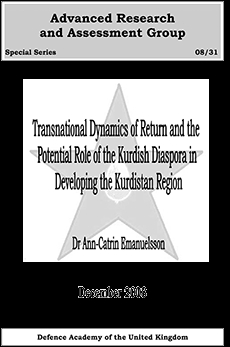| Éditeur : Defence Academy of the UK | Date & Lieu : 2008, Swindon - England |
| Préface : | Pages : 58 |
| Traduction : | ISBN : 978-1-905962-64-8 |
| Langue : Anglais | Format : 210x295 mm |
| Code FIKP : Liv. Eng. Ema. Tra. N° 2050 | Thème : Politique |
|
Présentation
|
Table des Matières | Introduction | Identité | ||
 Role of the Kurdish Diaspora in Developing the Kurdistan Region | |||||
| Table des Matières | ||||
| ||||